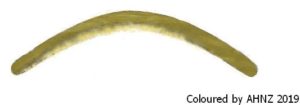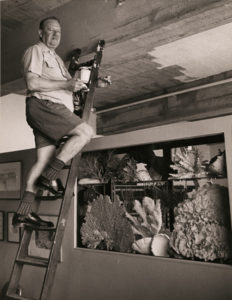1925: Maori Boomerang Discovered
June 26, 2019
By AHNZ
 Along with the Tamil Bell, the Korotangi, and the Coberg Stump comes this Muriwai beach boomerang. Discovered in 1925, it’s one of those amazing and seemingly anachronistic objects that defy mainstream understanding of New Zealand history.
Along with the Tamil Bell, the Korotangi, and the Coberg Stump comes this Muriwai beach boomerang. Discovered in 1925, it’s one of those amazing and seemingly anachronistic objects that defy mainstream understanding of New Zealand history.
 William Powell, the discoverer, was a self-taught naturalist who gave himself an Anarchist education like all the best Kiwis do. He would go on to have a high place at the Auckland War Memorial Museum and be made an honorary doctor though his knowledge did not come from within the university system. Probably the greatest authority in New Zealand shellfish there will ever be.
William Powell, the discoverer, was a self-taught naturalist who gave himself an Anarchist education like all the best Kiwis do. He would go on to have a high place at the Auckland War Memorial Museum and be made an honorary doctor though his knowledge did not come from within the university system. Probably the greatest authority in New Zealand shellfish there will ever be.
As such, aged 24, young Powell was to be found in November 1925 fossicking through an old Maori kitchen midden at Muriwai Beach. Throughout the 1920s and 1930s lots of people freely explored the many archaeological sites of West Auckland making discoveries that the State no longer permits.
In 2019 we foolishly worry about throwing away plastic bags that may take decades to decompose. Maoris threw their discarded wrapping refuse, shells, into great heaps called middens, that never break down in a million years. Usually these midden contain the remains of local shellfish, fish bones, charcoal, and burnt rocks. William found a boomerang!
“Before proceeding further, the following is a detailed description of the boomerang found:—The shape is similar to a common type found in South-east Queensland—a local form known as “Berran.” This museum possesses a specimen very similar in shape and size to the Muriwai one, and is illustrated as B in the accompanying plate in comparison with A from Muriwai.”
“In size the Muriwai boomerang is 18½ inches between verticals and 20½ inches along the curved axis, also being 1½ inches wide and 3-10 of-an-inch thick. One face has been weathered by sand action and exposure, but the other shows a fine scraped finish. The wood, no doubt much altered by exposure and weathering, is light and comparatively soft. At first glance the graining suggests kauri as the component timber but botanical opinion suggests tawhero, a common northern timber tree.”- Hamilton (1926)

Here is the only known image. The artefact itself was given to the Dominion Museum (as the War Museum was then known.) Because Hamilton says it resembles kauri I’ve given it a bit of colour and flipped the image for a better look. The boomerang has probably been sitting ignored in the Museum vault for just about 100 years now and without the benefit of modern dating techniques.

Powell’s boomerang may be evidence of early New Zealanders having contact with Australian Aboriginals. Perhaps they made their own copies before tiring of the novelty and throwing it on their rubbish heap. Perhaps it came from the days of Martial Law New South Wales with sealers or whalers? Perhaps it came at the time of Tasman, Cook, or de Surville? Perhaps with the Arabs.
Maybe some other 1920s beach wanderer lost his boomerang and it landed on Powell’s recently-exposed midden heap?
Someone should write to the Museum and see what’s what.
—
Note. The discovery was made on 29th of November, 1925
ref. BOOMERANG FOUND AT MURIWAI BEACH, AUCKLAND; Hamilton, The Journal of the Polynesian Society, Volume 35, No. 137 (1926)
image ref. Doctor Powell painting his own workplace, Auckland War Museum, 1960; Aucklandmuseum.com
ref. Story: Powell, Arthur William Baden; Te Ara
Note 2019 “It’s kind of weapon used by “TAMIL PEOPLE” for past 4000 years- we call it as ” VALARI”. its was often misunderstood as aborigial boomerang.
THERE IS GENETIC EVIDENCE FOR SOUTH INDIAN TAMIL PEOPLE WERE MIGRATED TO AUSTRALIA AROUND 4200 YEARS AGO by “SEA”. ”
– Mani Kandan; AHNZ comment; Facebook
Note 2020 I have written to the museum and received recent photos of the object. Wanted to share them in a journal but the one I wanted to publish to is running out of steam…
Note 2020 “If you read about ‘The Bradshaw Paintings’ of the Kimberly…you may find the answer. A displaced tribe who had ocean sailing capabilities, (when sea levels were much lower than they are today, roughly 12,000 years ago)..so not so far to sail. There was also an early style of Maori tattoo called Moko Kuri, which exactly matched paintings in the Kimberly. (REF: John White Ancient History of the Maori. REF: Ian Wilson Lost World of the Kimberly). This tribe also used boomerangs (they weren’t Aborigines)”- Don Jacobs; AHNZ comment; Facebook
 Like Comment Share
Like Comment Share





